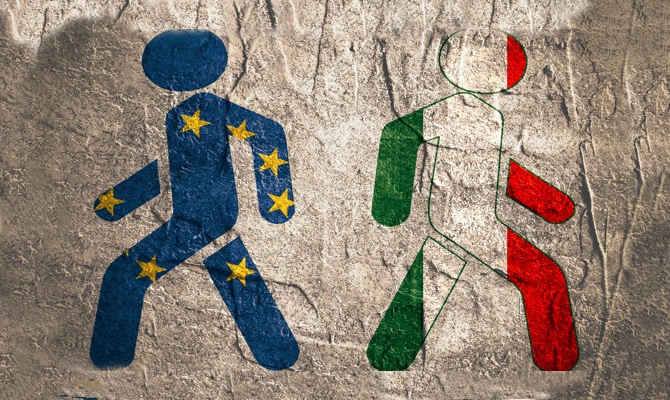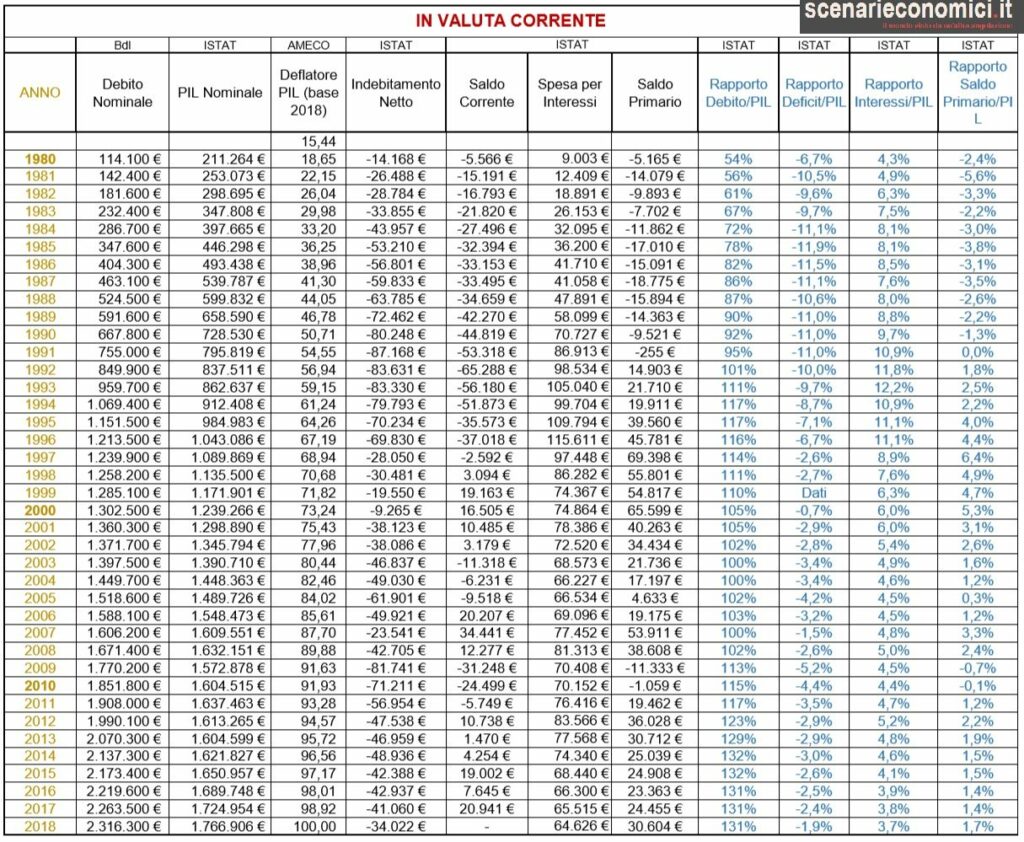Outside of Europe? Because? And how?

by Davide Gionco
Italy has been in a profound economic and social crisis for at least 25 years or since the political decisions taken in the European Treaty of Maastricht of 1992 came into force. Since then it has been a continuous worsening and a continuous tightening of the constraints on economic development policies in our country. The obligation to reduce the debt / GDP ratio to 60% combined with the 3% limit on the deficit / GDP ratio has forced various governments to repeatedly make primary budget assets . In other words, to collect more taxes from Italians than they spend each year in the form of services and public investments. See the positive values in the “Primary balance” column in the table below. From 1992 to date, Italians have paid more taxes than they received from the state for about 860 billion, about 14,300 euros for each Italian.
The implementation of this type of policies for over 25 years has led to a progressive impoverishment of the country, with an increase in the number of poor people, a reduction in income, an increase in precarious work, an increase in emigration of our young people and the birth rate, caused by the lack of economic prospects.
All this to guarantee the financial income of a small group of power, the famous 1% of the world that is doing essentially what it wants with Italy.
More and more people in Italy are realizing that joining the European Union was a terribly wrong choice, which has damaged us.
European rules are therefore believed to be the main cause of our ills.
This is certainly true, but too many incapable politicians (if not sold to the strong financial powers) who have governed us have also taken a lot, applying those European rules in a more realistic way than the king.
International treaties are not equivalent to laws that are strictly enforced, complete with police and courts, in a democratic country. To those who study history, but also to those who study today's geopolitics, it is quite clear that international treaties are respected more by the weakest and are respected less by the strongest.
In these years of the European Union, countries like Germany and France, but also the Netherlands, Luxembourg and Ireland, have been "more equal than the others". They demanded that "victim" countries such as Italy and Greece rigorously apply the provisions of the various treaties, while they disregarded the parts of the treaties that were not functional to their economic interests, in particular those linked to large German industries (with the port of Rotterdam ) and to the main European financial institutions.
To be clear: being in the EU for some countries has been, and still is, advantageous, while for others it has been harmful. Germany repeatedly breaches the 6% constraint on trade balance assets. France repeatedly overrides the constraints on the public deficit. Countries like Luxembourg, the Netherlands and Ireland are tax havens within the EU, untouchable.
So the question is not simply "leaving the European Union" to free ourselves from the constraints of those rules, but it is about finding a way of not being forced to implement those wrong rules.
Let's take a concrete example. Great Britain, which voted YES to Brexit and is exiting (badly) from the EU, was in the Union, but with a whole series of exceptions, so the "European rules" that were in force for the United Kingdom were not the same as in Italy. Other European countries, but not belonging to the Union, such as Norway and Switzerland, have signed a series of agreements and treaties with the EU, such as the Schengen Treaty on free movement and not a few economic agreements, for which the their actual situation, from the juridical-international point of view, is not so distant from what was the position of the United Kingdom.
As if to say: the adoption of the European rules is not something black or white, but it is something made of a whole range of shades from white to black, which vary from the radical implementation of what is foreseen in the European treaties (as it has done and does the 'Italy, paying dearly for the consequences), to the point of total extraneousness to European rules (as for example Russia does), but passing through many intermediate situations, such as that of Germany and France, which violate the treaties without fear of being sanctioned and recalls, such as that of Switzerland which is formally out, but adopts many EU rules.
These premises are very important to understand the way forward to free Italy from the obligations of implementing the European rules that harm us so much.
If we look not at the theory, but at the practice; if we look not at the “No Europe” ideology, but at the substance “let's get rid of those rules”, then we can imagine a path of liberation from European rules , from the rules that favor the international finance that is plundering us. Following a path is different than leaving the European Union overnight, following a political decision.
The ideological option offers us a single solution: to create an “anti-European” party, win the elections, go to the government and leave the European treaties.
The pragmatic option, on the other hand, makes us look to Germany and France, which despite being in the EU does not respect the "uncomfortable" rules that the EU imposes on others. If Italy knew how to have the same bargaining power as those countries, it could serenely ignore the "letters" of the European Commission, the calls of the ECB and send home with a handful of flies any Troika functions that came to Rome to blackmail the government and parliament, as it happened in 2011.
The pragmatic option also makes us look to Switzerland and Norway, which have decided to accede to some European treaties and not others, which have entered into trade and cooperation agreements with the EU, but without the obligation to be subject to constraints own budgetary policies.
The pragmatic option allows a country to reap the benefits and needs of a country that is geographically inserted in Europe. In fact, leaving the EU slamming the door and closing relations with our neighbors is certainly not an advantageous solution for our country.
The key issue is " bargaining power ". What is it that allows France and Germany to violate the European treaties, while other countries are not allowed to do so?
I believe that there are two fundamental factors which guarantee these countries such freedom of action.
The first factor is the awareness of one's own ruling class of bargaining power. France and Germany know that without them the European Union would not exist. They know they are big countries, with an important financial and industrial system.
If the European Commission thought of sending a "letter" and activating an infringement procedure against them, they would simply ignore it, from an official point of view. And behind the scenes they would send the European official on duty to say “remember that we are France and Germany and don't break up…”.
The second decisive factor is to free oneself from the tools of blackmail .
The power groups that gravitate around Frankfurt, Paris and Brussels have two important weapons of blackmail against "recalcitrant" European countries, such as was Tsipras's Greece in 2015 or Berlusconi's Italy in 2011 (which had questioned the single euro currency and EU policies in some of his speeches).
In 2011 the exponents of the European Troika introduced themselves (facts demonstrated by the interviews given among others by the Hon.Andrea Orlando of the PD and Massimo Garavaglia of the League, available on Bbyoblu) to the Italian political leaders saying that if Berlusconi had not resigned, leaving the place for Mario Monti, they would have stopped buying Italian government bonds on the markets, leaving the Italian state without liquidity to pay salaries and suppliers in just 2 months. "They" who? But of course those who have the money to buy large quantities of securities on the markets: the ECB and the main European financial institutions.
The fact that Italy does not have its own liquidity reserves to pay the salaries of public employees and its suppliers, but that it therefore depends on the benevolence of the Troika and of those it represents, prevents any government from taking conflicting positions. with their interests. And, therefore, it prevents them from breaking the European treaties, which were written to protect their interests. France and Germany, on the other hand, do not have this problem, because their governments operate in synergy with the aforementioned financial powers that act to rob Italy's wealth.
The second power of blackmail by the Troika is the possibility of blocking the private circuit of bank payments, which was done in Greece in 2015 to convince Tsipras and to comply with the demands of the Franco-German "creditors". The Troika has the power to block access to ATMs to convert our savings into banknotes, to block payments with ATMs and credit cards. So to block the economy of the country, which could not happen when payments were mostly made through banknotes, endorsed checks, endorsements, etc.
If the electronic payments platform, which today represent about 95% of the total, is in the hands of the ECB which controls all the banks, they can go to the government in charge and threaten to block the economy of the entire country if they do not it adapts to their requests, specifically the requests to strictly respect the European treaties.
Having made these considerations, it is concluded that it is unrealistic to think of embarking on an exit path from the European Union, as well as a path of pragmatic "de facto liberation" from the need to respect all the wrong rules of the EU (like France and Germany), if you don't first get rid of the blackmail weapons that the Troika possesses.
So the real difference is not between leaving the EU slamming the door or staying in it respecting all the rules, but it is between having or not having the concrete ability to free itself from the weapons of blackmail that the EU uses against us. In addition, of course, to having the awareness of being able to free oneself from this system of power.
But how can we free ourselves from these weapons of blackmail?
To free ourselves from the blackmail of the lack of liquidity for the State, the only possible solution is to start issuing a parallel public currency , which circulates in parallel and independently of the euro, being issued by a public subject subject to political control and being usable for the payment of taxes, which makes it acceptable and spendable on the Italian territory. Once the Troika ceases to purchase Italian government bonds, all payments could still be honored using the parallel currency. At that point the blackmail weapon would be totally blunt and ineffective and Italy could send back the letters from Brussels, without fear of running out of liquidity.
Proposals in this regard are already circulating: the Tax Credit Certificates, the SIRE of Positive Money, the notes of Nino Galloni. All proposals contained in the National Salvation Plan www.pianodisalvezzanazionale.it .
To free ourselves from the blackmail of the blocking of the banking and ATM payments system, the only solution is to create a payment platform that is independent from the control of the ECB and independent from private banks. In reality, the operation is not that complex, because citizens and businesses in Italy already have a unilateral fiscal current account , through which they pay taxes to the government. The current account number is our tax code or the VAT number of our company. It would be enough to make the relations between these bilateral current accounts (I pay the state and the state pays me) and then multilateral (from the fiscal current account I Tizio can pay Caius), to transform our tax payment system into a public banking platform with support of our payments. Possibly linked to the parallel currency issued by the State, referred to in the previous paragraph. A proposal in this sense is that of the Public Savings Accounts, again presented in the National Salvation Plan.
Once this reform is implemented, the Troika's second blackmail weapon would also become blunt.
Finally, freed from the blackmail weapons of the EU, to free ourselves from the system of European rules it will be enough to be aware of what Italy represents in Europe: a great country, with a great economy, with its own dignity, with a suffering people. and whose needs must be above the interests of international financial groups. Italy will be able to decide, having the strength to do so, whether to stay within the European Union, but only adopting the rules it deems convenient to adopt (and rejecting those that do not suit us) or whether to decide to officially exit the European treaties. The decision on the merits by weighing the pros and cons can be taken in all serenity, without being subjected to blackmail of various kinds, as is the case today.
In conclusion, I would like to invite all those who have understood the problems deriving from belonging to the European Union not to divide themselves on useless "anti-European" ideological disputes, but to focus above all on the "pragmatic VAT" or on the study of the path to follow to free ourselves from weapons of blackmail by the international financial powers and on how to raise awareness of what Italy can afford to do in Europe.

Thanks to our Telegram channel you can stay updated on the publication of new articles of Economic Scenarios.
The article Outside Europe? Because? And how? comes from ScenariEconomici.it .
This is a machine translation of a post published on Scenari Economici at the URL https://scenarieconomici.it/fuori-dalleuropa-perche-e-come/ on Sat, 17 Oct 2020 11:58:17 +0000.


